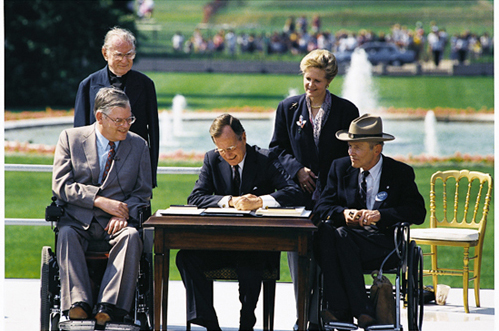Essay: The Americans with Disabilities Act is a milestone, but three bills would build on its foundation
By Franklin Elieh
Sunday marks the 30th anniversary of the Americans with Disabilities Act. While the law brought much-needed improvements and independence to many aspects of the lives of persons with disabilities, it also fell short in key areas—especially in light of the COVID-19 pandemic.
ADA was a milestone in civil rights law, establishing a bedrock of fair and equal treatment and protections for persons with disabilities for the first time in our nation’s history. Covering issues including access to transportation and education, employment benefits and anti-discrimination protections, the act applies to more than 60 million Americans.
While many gains have been made, global pandemic challenges or not, we still have much to do to improve access and equality for people with disabilities. For instance, there needs to be more accountability and enforcement for organizations failing to meet ADA requirements. Many special interests and lobbying groups continue to chip away at those requirements, especially in essential medical services and equipment as well as accessible and affordable housing.
Disability advocacy groups must fight each year for access to basic services and equal representation in the workforce. What basic improvements can be made to strengthen the ADA?
One simple way is not to cut resources to disabled people in the state budget, which currently proposes nearly $500 million in Medicare benefits cuts for those with disabilities. These cuts would include in-home support services for nearly 600,000 elderly and disabled people that allow them to live independently.
“While many gains have been made, the global coronavirus pandemic has illuminated that we still have much to do with improving access and equality for people with disabilities.”

Lawmakers should also pass three bills now stalled in the Legislature. Assembly Bill 2328 requires more disabled persons to be hired for well-paid government jobs. The essence of the bill is equal representation of disabled people in American life, one of the central tenets of the ADA.
Senate Bill 214 would help low-income disabled people leave nursing homes if they choose and return comfortably to their own homes. And a third bill, AB 2792, provides better access to a critical service—mobile fueling on demand. Californians with disabilities have great difficulty using traditional gas stations.
Together, these bills would strengthen independence and autonomy for one of America’s largest minorities. On the 30th anniversary of the ADA, we urge the Legislature to support the needs of people with disabilities.






Be the first to comment on "Equality for the disabled"